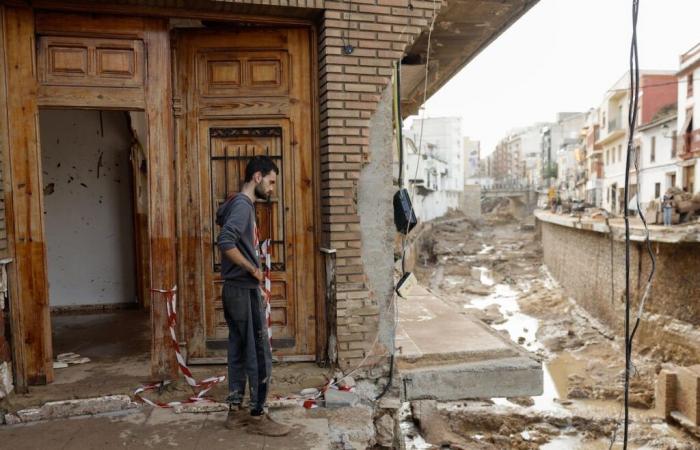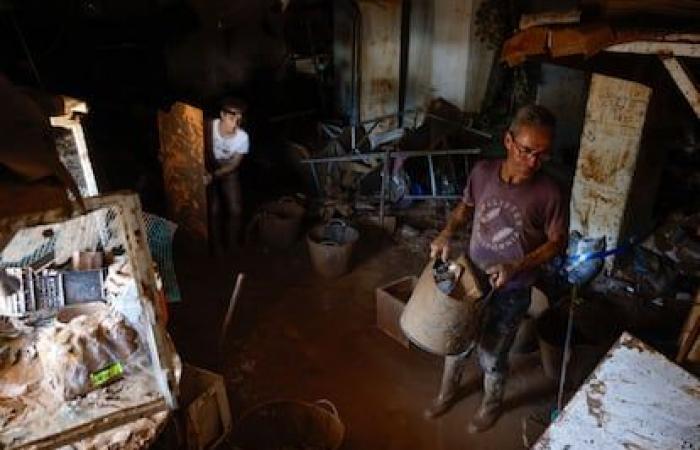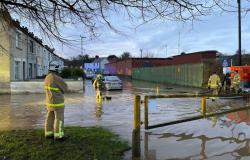Everything that was taken for granted in Chiva is no longer there. The residents of the municipality that recorded the record rainfall during the dana cannot call each other by phone. They have no way to locate their missing persons or how to listen to the radio. They don't know for sure what is happening in their town, much less in those around them. They know what comes to them through word of mouth. Those who maintain their homes cannot flush the toilet or take a shower. There is a lack of food and drinking water. Since Tuesday, when the storm dumped 420 liters per square meter in the area, these almost 17,000 residents are without running water, without electricity, without telephone signal, much less internet. Sending a WhatsApp is now the luxury of a devastated town in which at least 10 people have died. Although there will be more because there are many missing. “Possibly, we reach a hundred due to the hundreds and hundreds of cars down throughout the municipal area. We hope to have enough victims. Every time a dog or a shovel gets into the mud, bodies appear,” the mayor, Amparo Fort, told the Efe agency.
Kai Försterling (EFE)
The current split the municipality in two. The water, which ran wildly down the Rambla del Poyo, washed away bridges, hundreds of cars and made several houses disappear. Some ended up being scrapped in half. What made everything worse, says parish priest Javier Costa, is that the vehicles dragged by the waterspout blocked the steep streets that normally drain the rainfall from storms and, once again, the neighbors found themselves trapped in a mousetrap. The water rose and rose until, in some cases, it drowned them. “I lack words,” says Salvador Martínez, 52, after removing a tree from his garage. “We are alive, which is what is important, but we know nothing, we have no information,” he says. He refers to his dead neighbors and the missing people; no one dares to say how many there are.
One of the victims died very close to that area of town. Her name was Mari Luz and she died, struck by the current in her own home while her family was trying to contact her. Her neighbor Jésica Besteiro knew that something had happened to her when the water exceeded the doorbell and she did not see her looking out of the upstairs window. “She was always there. We shouted at her: 'Mari Luz, Mari Luz!', but Mari Luz was no longer there,” he says.
Chiva asks for help. Besteiro is one of the many neighbors outraged because they find themselves alone trying to repair a damage that is currently in the hands of volunteers. “The only thing I ask is that there is no shortage of food because I have a baby, but here the City Council has not given us anything. Neither does the Civil Guard, who you see here 15 at a time without a stain because they don't give you a single hand,” she claims, covered in mud from head to toe. The mayor has acknowledged that they “urgently need water and food” because “there are already neighbors on the street slapping each other to get them.”
Almost three days after the storm, Chiva pilgrims. To the City Hall, where they write down in a notebook the incidents, the damage, the emergencies, the missing people, the hundreds of damaged cars… To the Espai Joven, a municipal center where there is supposed to be Wi-Fi. To a place full of junk, where it is not very clear why there is intermittent light and internet. To the butcher shop that is getting rid of the goods because the refrigerators don't work, to the supermarket to look for drinking water that is no longer available. To a water pump that fills dirty drums to clean floors and flush the toilet. “This is true chaos,” claims José, a member of the municipal brigade. “There is neither the EMU, nor the Army, nor dicks here. “We are there and that's it,” he complains.
Francisco Esteso, chief commissioner of the local police, is more diplomatic, but reveals the shortcomings of an apparently forgotten town: “We need food, volunteers to clean the streets and houses, ambulances, gasoline…” There is even a lack of shovels to clean the mud. The situation, he says, is “catastrophic.” “The ravine has carried away a multitude of cars and has devastated the asphalt. The urbanizations are cut off and there are people who need food and medicine. It's exasperating. The most critical thing is the anxiety and helplessness of not being able to go to all the places from where they are calling us,” he says.
Finally, on Thursday afternoon, the president of the Generalitat, Carlos Mazón, asked the Ministry of Defense for help to incorporate the Army, of which 1,200 troops are already deployed, in logistical tasks and distribution of aid to those affected. The Government announced that it will add 500 more soldiers to these tasks and, in addition, to open access routes by land.
Chiva continues isolated. Although the accesses towards Madrid have been reopened, a gigantic blockage of burst cars and trucks still blocks the A3 towards Valencia. Dozens of vehicles have accumulated since Tuesday and make it impossible to reach the town through that and two other alternative roads. “Jump the median and walk, but who knows what you're going to find,” recommends a civil guard. Less than half an hour later, with the EMU back on that section of the highway, a body appeared. On the shoulder opposite, a son, searching for his father, let out a howl of pain.







